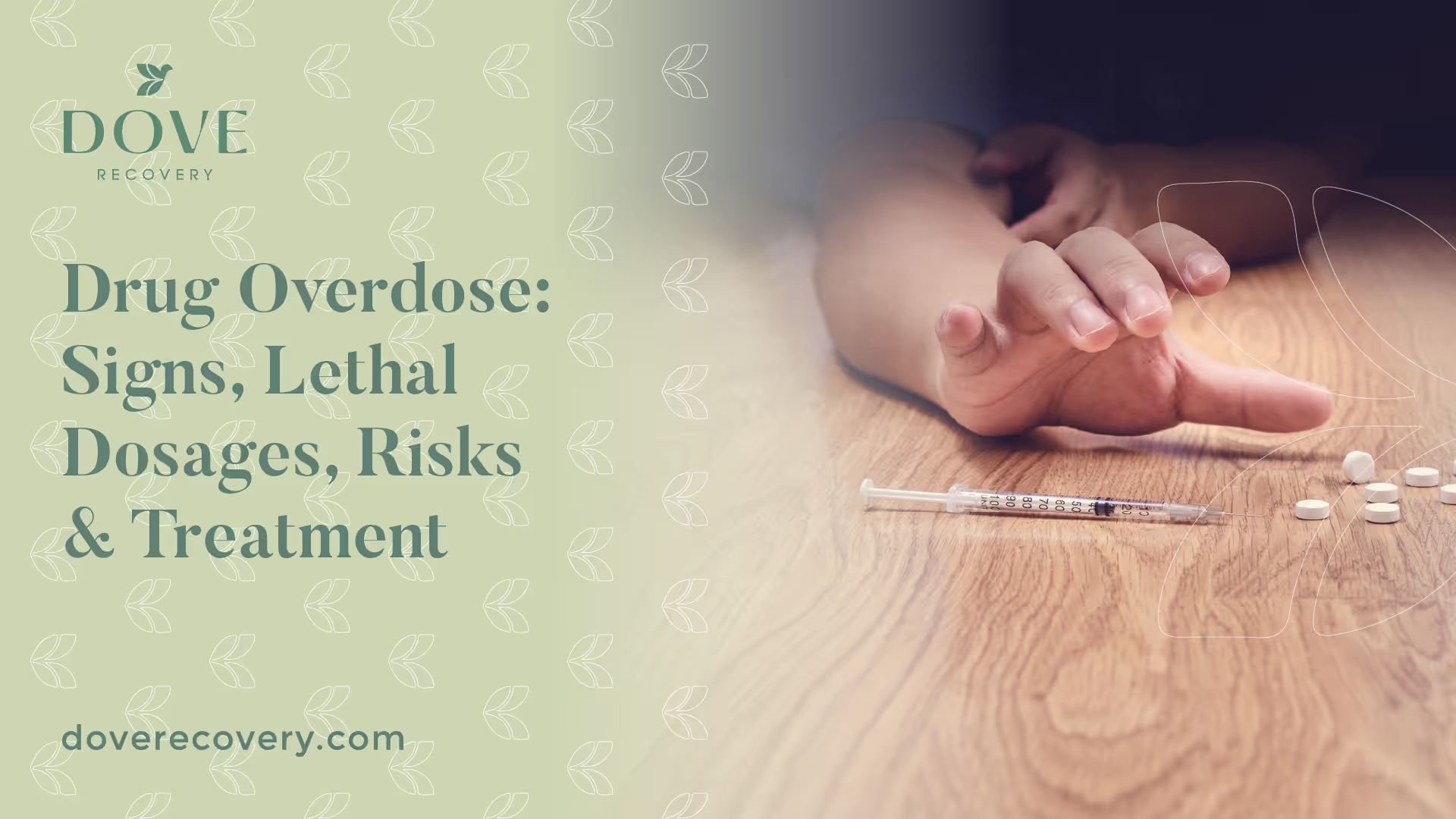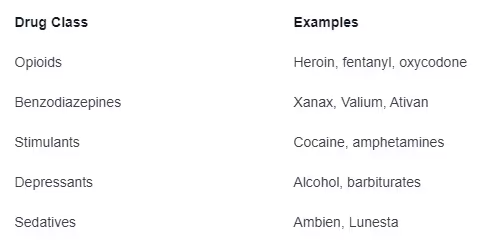Drug Overdose: Signs, Lethal Dosages, Risks & Treatment

Understanding Drug Overdose
When it comes to drug use, it's essential to be aware of the risks associated with drug overdose. Understanding what a drug overdose is, the common types of drugs involved, and the factors that contribute to overdose risk can help individuals and communities take appropriate preventive measures.

What is a Drug Overdose?
A drug overdose occurs when an individual consumes a quantity or combination of drugs that exceeds the body's ability to metabolize or eliminate them. This can lead to toxic levels of the drug(s) in the body, resulting in severe physiological and psychological symptoms and, in some cases, death.
The severity of a drug overdose can vary depending on factors such as the type of drug(s) involved, the dosage, the individual's tolerance level, and their overall health condition. Prompt recognition and intervention are crucial for preventing fatal outcomes.
Common Types of Drugs Involved in Overdoses
Drug overdoses can involve various types of drugs, including prescription medications, illicit substances, and even over-the-counter drugs. Some commonly involved drug classes in overdose cases include:

It's important to note that the list above is not exhaustive, and there are many other drugs that can lead to overdose. Understanding the potential risks associated with specific drugs can help individuals make informed decisions and seek appropriate help and treatment if needed.
Factors That Contribute to Overdose Risk
Several factors can contribute to an increased risk of drug overdose. These can include:
- Polydrug use: Concurrent use of multiple drugs, including mixing substances, can significantly increase the risk of overdose.
- Tolerance and dependency: Building tolerance to a drug or developing a physical or psychological dependence can lead individuals to increase their dosage, increasing the risk of overdose.
- Inconsistent drug potency: Illicit drugs, in particular, can vary significantly in potency, making it challenging for users to accurately gauge the appropriate dosage.
- Lack of awareness and education: Limited knowledge about drug effects, interactions, and safe consumption practices can increase the risk of unintentional overdose.
Recognizing these contributing factors is crucial in implementing effective drug overdose prevention strategies and promoting education and awareness about the risks associated with drug use.
Understanding the basics of drug overdose, the common types of drugs involved, and the contributing factors can help individuals and communities take steps towards overdose prevention and provide timely assistance to those in need. If you or someone you know is struggling with drug use or has experienced an overdose, reach out to healthcare professionals or seek support from organizations specializing in overdose recovery.
Recognizing Overdose Symptoms
When it comes to drug overdose, early recognition of the symptoms is crucial for prompt intervention and potentially saving lives. Being able to identify the signs of an overdose can help you take appropriate action and seek immediate medical assistance. This section will explore the general signs of overdose and specific symptoms associated with different drug classes.
General Signs of Overdose
While the specific symptoms of an overdose can vary depending on the drug involved, there are some general signs that may indicate an overdose is occurring:
- Altered mental state: This can range from confusion and disorientation to unconsciousness.
- Difficulty breathing: Shallow or labored breathing, slow respiratory rate, or complete cessation of breathing.
- Extreme changes in body temperature: Sweating, chills, or a high fever may be present.
- Skin changes: Bluish tint to the lips, nails, or skin, indicating poor oxygenation.
- Irregular heartbeat: Rapid, slow, or erratic heart rate.
- Vomiting or nausea: Persistent vomiting or inability to keep food or fluids down.
- Seizures: Uncontrolled muscular convulsions or body movements.
- Loss of consciousness: In severe cases, the individual may become unresponsive.
It is important to note that these signs may not always be present, and the severity of symptoms can vary depending on the drug, dose, and individual factors. If you suspect someone is experiencing an overdose, it is crucial to call emergency services immediately.
Specific Symptoms for Different Drug Classes
Different drug classes may have specific symptoms associated with an overdose. Here are some examples:
Opioids: Opioid overdose symptoms may include pinpoint pupils, respiratory depression, extreme drowsiness, and loss of consciousness.
Stimulants: Stimulant overdose symptoms may include agitation, rapid heartbeat, high blood pressure, hallucinations, and seizures. If you suspect a stimulant overdose, it is crucial to seek medical help immediately.
Depressants: Depressant overdose symptoms may include slowed breathing, slurred speech, confusion, impaired coordination, and loss of consciousness. Prompt medical attention is necessary in cases of depressant overdose.
It's important to remember that these symptoms are not exhaustive, and individual reactions to an overdose can vary. If you suspect an overdose, it is always safer to err on the side of caution and seek immediate medical assistance.
Recognizing the signs of an overdose is the first step in ensuring appropriate medical intervention. Understanding the specific symptoms associated with different drug classes can further aid in identifying the substances involved. By being vigilant and knowledgeable about overdose symptoms, you can play a vital role in potentially saving lives.
Dangers and Complications of Overdose
When it comes to drug overdose, there are significant dangers and potential complications that can arise. Understanding these risks is crucial for prompt identification and appropriate response. This section will explore the immediate risks to health and life during an overdose as well as the long-term health consequences that may follow.
Immediate Risks to Health and Life
Drug overdose poses immediate threats to an individual's health and can be life-threatening if not addressed promptly. The specific risks vary depending on the type of drug involved, the dosage taken, and individual factors. Some common immediate risks of drug overdose include:
- Respiratory depression: Many drugs can depress the central nervous system, leading to slowed or shallow breathing. In severe cases, this can result in respiratory failure and oxygen deprivation to the brain and other vital organs.
- Cardiovascular complications: Certain drugs can cause irregular heart rhythms, increased blood pressure, or even heart attacks. These cardiovascular complications can have serious implications for overall health and well-being.
- Seizures: Some drugs, particularly stimulants, can trigger seizures during an overdose. Seizures can cause physical harm and lead to further complications.
- Unconsciousness and coma: In severe cases, an overdose can result in loss of consciousness, coma, or even death. Prompt medical intervention is essential to prevent further deterioration.
It is important to note that the risks associated with drug overdose can vary greatly depending on the specific drug involved.
Long-term Health Consequences
In addition to the immediate risks, drug overdose can have long-term health consequences that extend beyond the acute episode. The specific long-term effects depend on various factors, including the type and dosage of the drug involved, the duration of the overdose, and individual characteristics. Some potential long-term health consequences of drug overdose include:
- Organ damage: Prolonged oxygen deprivation during an overdose can lead to organ damage, particularly to the brain and heart. This damage can result in long-lasting impairments and increased risk of chronic health conditions.
- Neurological complications: Drugs that impact the central nervous system can have long-term effects on brain function, cognition, memory, and overall mental health. These complications can persist even after the overdose event.
- Psychological impacts: Drug overdose can have profound psychological effects, including post-traumatic stress disorder (PTSD), anxiety disorders, and depression. These mental health consequences can significantly impact an individual's overall well-being and quality of life.
- Substance use disorder: Overdose can be a wake-up call and serve as a turning point for individuals struggling with substance abuse. However, it is important to recognize that the risk of relapse and continued substance use remains high. Seeking appropriate treatment and support is crucial for long-term recovery.
It is essential to remember that the long-term health consequences of drug overdose can vary greatly depending on individual circumstances. Seeking appropriate medical treatment and support services is crucial for minimizing these potential long-term effects.
Understanding the immediate risks and long-term consequences of drug overdose highlights the importance of prompt recognition, emergency response, and access to medical treatment. Prevention and education play critical roles in minimizing the occurrence of drug overdoses.
Seeking Help and Treatment
When faced with a drug overdose situation, seeking immediate help and treatment is crucial to saving lives. Timely intervention can make a significant difference in preventing further harm and increasing the chances of recovery. In this section, we will explore the different aspects of seeking help and treatment for drug overdose.
Emergency Response for Overdose
In the event of a suspected drug overdose, it is essential to call emergency services right away by dialing the local emergency number, such as 911 in the United States. Prompt medical attention is vital in these situations, as it can provide life-saving interventions. Emergency medical personnel are trained to handle overdose cases and can administer appropriate treatments, such as naloxone for opioid overdoses.
It is important to provide accurate and detailed information to the emergency responders, including the type of drug involved, the quantity consumed (if known), and any other relevant information. This enables the medical professionals to provide the most effective and appropriate care.
Medical Treatment and Support
Once the individual experiencing a drug overdose has received emergency medical attention and stabilized, ongoing medical treatment and support are often necessary. The specific course of treatment will depend on the drug involved and the severity of the overdose. Medical professionals may administer medications, provide intravenous fluids, or perform other interventions to address the immediate health risks.
Following initial treatment, individuals who have experienced a drug overdose may require continued medical monitoring and support. This can include regular check-ups, counseling, and access to addiction specialists or mental health professionals. The goal is to address any underlying issues contributing to the overdose and provide support for long-term recovery.
Supportive Services for Recovery
Beyond the immediate medical treatment, individuals who have experienced a drug overdose often benefit from accessing supportive services for their recovery journey. These services can include counseling, therapy, support groups, and rehabilitation programs. Supportive services provide individuals with the tools and resources necessary to address the underlying causes of addiction and develop strategies for sustained recovery.
In addition to professional services, seeking support from friends, family, and peer support groups can play a significant role in the recovery process. It is important for individuals recovering from a drug overdose to have a strong support network that can offer encouragement, understanding, and accountability. Recovery is a journey that requires ongoing commitment and support, and there are many resources available to assist in this process.
When it comes to drug overdose, seeking help and treatment is essential for saving lives and supporting long-term recovery. By understanding the emergency response process, accessing appropriate medical treatment and support, and utilizing available resources, individuals who have experienced a drug overdose can take important steps towards healing and reclaiming their lives. Remember, there is hope and help available for those who need it.
Preventing Drug Overdose
Prevention is key when it comes to drug overdose. By implementing harm reduction strategies, promoting education and awareness, and providing resources for support and assistance, we can work towards reducing the risks associated with drug overdose.
Harm Reduction Strategies
Harm reduction strategies aim to minimize the negative consequences of drug use without requiring abstinence. These strategies focus on education, safety, and minimizing harm to individuals who use drugs. Some common harm reduction strategies include:
- Needle exchange programs: These programs provide sterile needles to individuals who use injectable drugs, reducing the risk of bloodborne infections such as HIV and hepatitis.
- Safe injection sites: These facilities provide a safe and supervised environment for individuals to use drugs, reducing the risk of overdose and providing access to medical assistance if necessary.
- Naloxone distribution: Naloxone is a medication that can reverse the effects of an opioid overdose. Distributing naloxone to individuals who use opioids, as well as their friends and family members, can save lives in emergency situations.
By implementing harm reduction strategies, we can reduce the harms associated with drug use and create a more supportive environment for individuals struggling with addiction.
Education and Awareness
Education and awareness play a crucial role in preventing drug overdose. By providing accurate and accessible information, we can empower individuals to make informed decisions about drug use and understand the risks involved. Key aspects of education and awareness include:
- Drug education programs: These programs provide comprehensive information about the effects of different drugs, their risks, and potential consequences. They aim to promote critical thinking and provide individuals with the tools to make informed choices.
- Awareness campaigns: Public awareness campaigns raise awareness about the dangers of drug misuse and overdose. These campaigns can target both the general population and specific communities that may be more vulnerable to drug-related harms.
- Training for healthcare professionals: Training healthcare professionals on recognizing the signs of drug overdose and providing appropriate care is vital. This ensures timely intervention and access to treatment for individuals who experience an overdose.
By prioritizing education and awareness, we can equip individuals with the knowledge and skills they need to protect themselves and others from drug overdose.
Resources for Support and Assistance
Access to resources for support and assistance is essential for both individuals struggling with addiction and their loved ones. These resources can provide valuable guidance, support, and access to treatment options. Some key resources include:
- Helplines and hotlines: Helplines provide confidential support, information, and referrals to individuals seeking help for drug addiction or those concerned about someone they know.
- Counseling and therapy services: Professional counseling and therapy services can offer guidance, coping strategies, and emotional support to individuals and their families affected by drug addiction.
- Support groups: Support groups provide a safe and understanding environment where individuals can share their experiences, gain support from others facing similar challenges, and learn from one another's recovery journeys.
By making these resources readily available and promoting their accessibility, we can ensure that individuals have the support they need to overcome addiction and reduce the risk of drug overdose.
Preventing drug overdose requires a multi-faceted approach that addresses the individual, community, and societal factors contributing to drug misuse. By implementing harm reduction strategies, promoting education and awareness, and providing resources for support and assistance, we can take significant steps toward reducing the risks associated with drug overdose.
Conclusion
By prioritizing prevention, seeking immediate medical attention in the event of an overdose, and accessing appropriate treatment and supportive services, individuals can take important steps towards healing and recovery. While drug overdose can have serious immediate and long-term health consequences, it is important to remember that recovery is possible with the right support and resources. By working together to promote education, awareness, and harm reduction, we can create a safer and more supportive environment for individuals struggling with addiction.
